|
|
|
Sort Order |
|
|
|
Items / Page
|
|
|
|
|
|
|
| Srl | Item |
| 1 |
ID:
103875
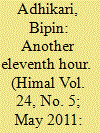

|
|
|
| 2 |
ID:
144145
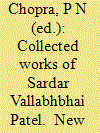

|
|
|
|
|
| Publication |
New Delhi, Konark Publishers Pvt Ltd, 2015.
|
| Description |
xxi, 216p.hbk
|
| Contents |
Vol. XI (Special Volume): Sardar Patel as Constitution maker.
|
| Standard Number |
9789322008444
|
|
|
|
|
|
|
|
|
|
|
|
Copies: C:1/I:0,R:1,Q:0
Circulation
| Accession# | Call# | Current Location | Status | Policy | Location |
| 058594 | 954.035/CHO 058594 | Main | On Shelf | Reference books | |
|
|
|
|
| 3 |
ID:
102566
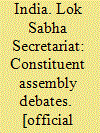

|
|
|
|
|
| Edition |
5th reprint
|
| Publication |
New Delhi, Lok Sabha Secretariat, 2009.
|
| Description |
xx, p.
|
| Contents |
Vol. No. I-VI (9 December 1946 to 27 January 1948)
|
|
|
|
|
|
|
|
|
|
|
|
Copies: C:1/I:0,R:1,Q:0
Circulation
| Accession# | Call# | Current Location | Status | Policy | Location |
| 055666 | 342.54029/IND 055666 | Main | On Shelf | Reference books | |
|
|
|
|
| 4 |
ID:
102567
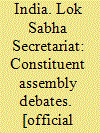

|
|
|
|
|
| Edition |
5th reprint
|
| Publication |
New Delhi, Lok Sabha Secretariat, 2009.
|
| Description |
Vol VII; p.
|
| Contents |
Vol. VII: (4 November 1948 to 8 January 1949)
|
|
|
|
|
|
|
|
|
|
|
|
Copies: C:1/I:0,R:1,Q:0
Circulation
| Accession# | Call# | Current Location | Status | Policy | Location |
| 055667 | 342.54029/IND 055667 | Main | On Shelf | Reference books | |
|
|
|
|
| 5 |
ID:
102569
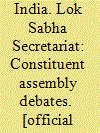

|
|
|
|
|
| Edition |
5th reprint
|
| Publication |
New Delhi, Lok Sabha Secretariat, 2009.
|
| Description |
Vol. viii; 961p.
|
| Contents |
Vol. VIII: 16 may 1949 to 16 June 1979
|
|
|
|
|
|
|
|
|
|
|
|
Copies: C:1/I:0,R:1,Q:0
Circulation
| Accession# | Call# | Current Location | Status | Policy | Location |
| 055668 | 342.54029/IND 055668 | Main | On Shelf | Reference books | |
|
|
|
|
| 6 |
ID:
102572
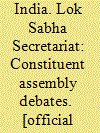

|
|
|
|
|
| Edition |
5th reprint
|
| Publication |
New Delhi, Lok Sabha Secretariat, 2009.
|
| Description |
Vol. ix; 1693p.
|
| Contents |
Vol. IX: 30 July 1949 to 18 September 1949
|
|
|
|
|
|
|
|
|
|
|
|
Copies: C:1/I:0,R:1,Q:0
Circulation
| Accession# | Call# | Current Location | Status | Policy | Location |
| 055669 | 342.54029/IND 055669 | Main | On Shelf | Reference books | |
|
|
|
|
| 7 |
ID:
102574
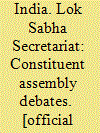

|
|
|
|
|
| Edition |
5th reprint
|
| Publication |
New Delhi, Lok Sabha Secretariat, 2009.
|
| Description |
Vol. x-xii; p.
|
| Contents |
Vol. X-XII: 6 October 1949 to 24 January 1950
|
|
|
|
|
|
|
|
|
|
|
|
Copies: C:1/I:0,R:1,Q:0
Circulation
| Accession# | Call# | Current Location | Status | Policy | Location |
| 055670 | 342.54029/IND 055670 | Main | On Shelf | Reference books | |
|
|
|
|
| 8 |
ID:
175889
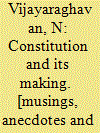

|
|
|
|
|
| Publication |
Haryana, OakBridge Publishing Pvt Ltd, 2021.
|
| Description |
xiv, 222p.Pbk
|
| Standard Number |
9789389176704
|
|
|
|
|
|
|
|
|
|
|
|
Copies: C:1/I:0,R:0,Q:0
Circulation
| Accession# | Call# | Current Location | Status | Policy | Location |
| 059920 | 342.54029/VIJ 059920 | Main | On Shelf | General | |
|
|
|
|
| 9 |
ID:
187286
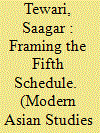

|
|
|
|
|
| Summary/Abstract |
As a means to resolve the Tribal Question in India, the centrality of the Fifth and Sixth Schedules of the Indian Constitution is widely acknowledged. However, their final incorporation, despite intense nationalist opposition in the run-up to Indian Independence, remains historically unexplained. This article addresses this lacuna by reconstructing the circumstances under which the Indian National Congress came to accept scheduling as a viable method of providing protection to tribal communities. This strategic shift can be explained as a result of combined political pressures generated by communist-led tribal movements and a steadily mounting challenge heralded by a new stream of educated middle-class tribal activists in eastern India. Foremost among the latter was Jaipal Singh Munda who mobilized a large constituency of supporters demanding a separate province of Jharkhand. Taken together, there is enough evidence to prove that in the period 1937–1950, the tribes were not silent and their collective agency had a deep impact on the constitution-making process. Finally, the article argues that this period witnessed a significant change in the character of the Congress as erstwhile freedom-fighters turned into ruling elites.
|
|
|
|
|
|
|
|
|
|
|
|
|
|
|
|
| 10 |
ID:
124973
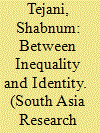

|
|
|
|
|
| Publication |
2013.
|
| Summary/Abstract |
Recent attention to the history of constitution-making in India reflects ongoing concerns about the difficulties and limitations of India's secular, democratic experiment. Scholars assessing India's secularism have pointed to the failure to separate the state from its involvement in religion from the outset. Through a study of the Constituent Assembly debates, this article suggests that the emphasis on 'religion' as the problem for secularism has been a distraction, taking the gaze away from the substantive arguments minorities were making about how their equal citizenship should be guaranteed. It remained unclear what recognition of 'minority' status was meant to achieve in postcolonial India and what it signified. In failing to recognise the claims of religious minorities for their equality, the Constituent Assembly reified their position as permanently unequal communities in the newly independent state.
|
|
|
|
|
|
|
|
|
|
|
|
|
|
|
|
| 11 |
ID:
160065
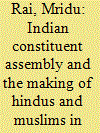

|
|
|
|
|
| Summary/Abstract |
Article 370 of the Indian constitution gives the northern province of Jammu and Kashmir special status within the union. Today that provision forms a nucleus of fierce political contention between secularists and religious nationalists in India, despite the manifest whittling down of the article's most significant aspects. This development is counterintuitive: the original intent of the article's introduction had no relation to questions of religion. This essay attempts to understand this unanticipated role, as a marker of the state's secularity or lack thereof, the article has come to play in Indian politics. It contends that the seeds were sown even at the time of shaping the Indian constitution of a perspective that viewed the people of Jammu and Kashmir according to their religious affiliations.
|
|
|
|
|
|
|
|
|
|
|
|
|
|
|
|
| 12 |
ID:
148023
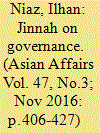

|
|
|
|
|
| Summary/Abstract |
This paper examines the views of Pakistan's founder, Mohammad Ali Jinnah, on a range of issues including sovereignty, civil-military relations, the civil service, industrialization, religion and the state, and national integration. Relying on Jinnah's own views, it reveals that selective engagement with what Jinnah thought has done no favours to Pakistan. Indeed, Pakistan has for all practical purposes, rejected nearly every policy prescription that its founder believed in and effectively repudiated what Jinnah stood for. While much attention has been paid to Jinnah's role in the partition of India or in the politics of the Indian Freedom Movement and the Pakistan Movement, comparatively little has been written about Jinnah's views on governance. This paper tries to initiate the process of filling this gap in the hope of generating a more holistic debate about what Pakistan's founder stood for as a statesman and state builder.
|
|
|
|
|
|
|
|
|
|
|
|
|
|
|
|
| 13 |
ID:
178864
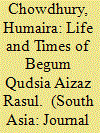

|
|
|
|
|
| Summary/Abstract |
This paper examines the life and times of a remarkable twentieth-century figure, Begum Qudsia Aizaz Rasul (1908–2001), the first and only Muslim woman in independent India’s Constituent Assembly which drafted the country’s Constitution. In doing so, it critically engages with the genre of autobiographical writing—the limits it imposed and the particular vantage points it offered. By drawing upon Begum Rasul’s private papers, her autobiography and her speeches in the Constituent Assembly debates from 1946 to 1950, this paper unpacks the ways in which she sought to negotiate her multiple and intersecting identities of class, gender and religious background. Her acts of self-fashioning provide critical insights into how Muslim women negotiated their identities in post-colonial India often in resistance to, and conformity with, the national status quo.
|
|
|
|
|
|
|
|
|
|
|
|
|
|
|
|
| 14 |
ID:
119967
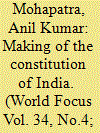

|
|
|
| 15 |
ID:
123681
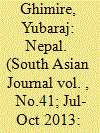

|
|
|
| 16 |
ID:
081892
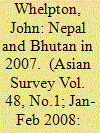

|
|
|
|
|
| Publication |
2008.
|
| Summary/Abstract |
Amid continuing unrest in Nepal's Tarai (Lowlands) region and elsewhere, eventual abolition of the monarchy looks certain. But implementation of the country's peace process remains stalled with postponement of the Constituent Assembly elections originally scheduled for June 2007 and disagreement between the Nepali Congress Party and leftist parties over the electoral system to be adopted for these polls. In Bhutan, the process of democratization appears to be deepening and the economy is growing, but the issue of Bhutanese refugees living in Nepal continues to be an irritant both domestically and in terms of intra-state relations
|
|
|
|
|
|
|
|
|
|
|
|
|
|
|
|
| 17 |
ID:
086678
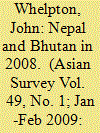

|
|
|
|
|
| Publication |
2009.
|
| Summary/Abstract |
In Nepal, the twice-postponed elections for the Constituent Assembly were successfully held in April 2008. The Maoists, who obtained a plurality of seats, took office at the head of a multi-party coalition following the formal abolition of the monarchy. Yet, fundamental issues still remained unresolved, including integrating the guerilla forces into the national army. In Bhutan, elections for the lower house were won decisively by the party led by Jigme Thinley, and the country's new Constitution was promulgated.
|
|
|
|
|
|
|
|
|
|
|
|
|
|
|
|
| 18 |
ID:
119093
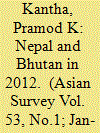

|
|
|
|
|
| Publication |
2013.
|
| Summary/Abstract |
Nepal's political transition switched into crisis mode as the Constituent Assembly (CA) dissolved on May 27 without delivering a constitution. While new elections for the CA appeared most likely, people's confidence in the ability of ever-feuding politicians to lead the troubled nation plunged to a new low. Anticipations grew in Bhutan over parliamentary elections in 2013. Bhutan's decision to establish diplomatic relations with China was a historic milestone.
|
|
|
|
|
|
|
|
|
|
|
|
|
|
|
|
| 19 |
ID:
160067
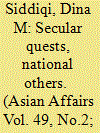

|
|
|
|
|
| Summary/Abstract |
How do we understand the 15th amendment of the Bangladeshi Constitution that restored the principle of secularism and simultaneously (re)inscribed certain populations as outside the cultural nation? I approach this question through a close reading of the Constituent Assembly debates of 1972. The precarious state of minorities, I contend, is not a symptom of an incomplete or failed secularism but a feature of the violence inherent to the nation-state form. The Bangladeshi example suggests not only that minority is a profoundly unstable category but that some minorities are visibly critical to national self-fashioning while others must be invisibilized as national others.
|
|
|
|
|
|
|
|
|
|
|
|
|
|
|
|
| 20 |
ID:
152018
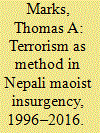

|
|
|
|
|
| Summary/Abstract |
During the period 1996–2006, the Communist Party of Nepal (Maoist) waged overt people’s war to seize state power and institute a new order that realized the party’s understanding of ‘New Democracy’ as posited by Mao Tse-tung. Contextual shifts led to a crucial strategic turning point in September 2005, when the Maoists agreed to a united front with estranged legal parties to oust the monarchy and establish a republic. Though touted as acceptance of political reintegration, the move was tactical rather than strategic. The party had no intention of supporting a parliamentary version of democracy and thus, 2006–2016, engaged in a covert effort to seize power. Central to this effort was the paramilitary Young Communist League (YCL), the members of which responded to inflammatory party verbiage and exhortations with attacks upon rival political actors. These attacks, academically and legally, were terrorism and offered a salient illustration of intra-state unrestricted warfare. Ultimately, organizational, national, and regional circumstances caused the main Maoist movement to move decisively away from its covert approach. By that time, however, radical splinters had embraced the use of terrorism against rival political actors, creating a situation whereby local politics is yet a dangerous endeavor in certain areas and at certain times.
|
|
|
|
|
|
|
|
|
|
|
|
|
|
|
|
|
|
|
|
|